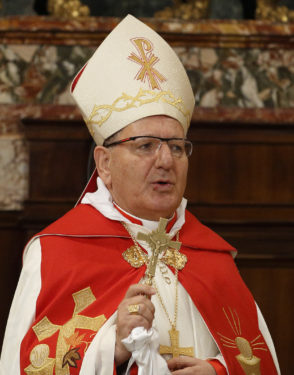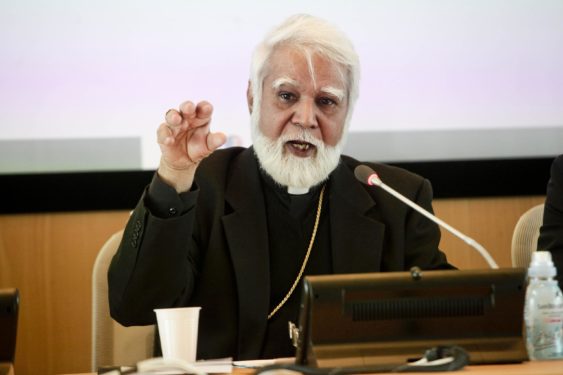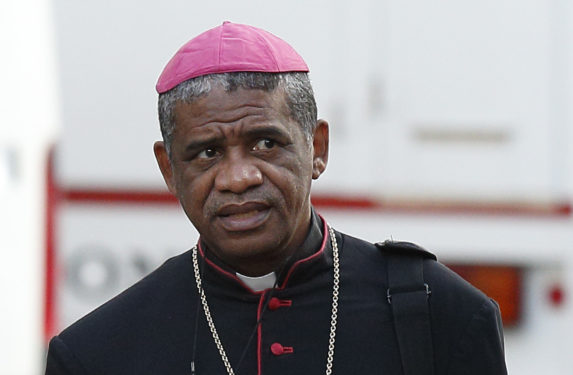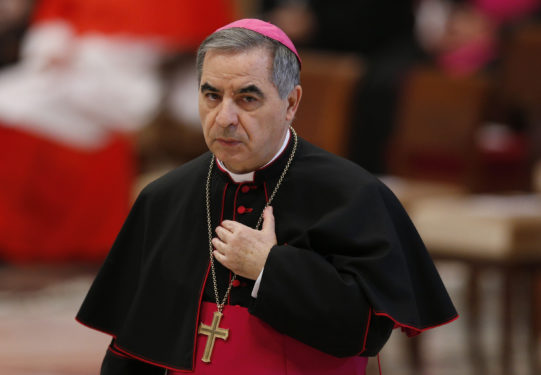By Cindy Wooden
VATICAN CITY (CNS) – Pope Francis announced he would make 14 new cardinals June 29, giving the red cardinal’s hat to the papal almoner, the Iraq-based patriarch of the Chaldean Catholic Church and the archbishop of Karachi, Pakistan, among others.
Announcing his choices May 20, the pope said that coming from 11 nations, the new cardinals “express the universality of the church, which continues to proclaim the merciful love of God to all people of the earth.”
Pope Francis’ list included three men over the age of 80 “who have distinguished themselves for their service to the church.”
When the pope made the announcement, the College of Cardinals had 213 members, 115 of whom were under the age of 80 and therefore eligible to vote in a conclave to elect a new pope. Cardinal Angelo Amato, prefect of the Congregation for Saints’ Causes, was to celebrate his 80th birthday June 8.
Under Pope Francis, the idea that some church posts and large archdioceses always are led by a cardinal is fading, but is not altogether gone. His latest choices included the papal vicar of Rome, the Cardinal-designate Angelo De Donatis, and the prefect of the Congregation for the Doctrine of the Faith, Cardinal-designate Luis F. Ladaria. But other traditional cardinal sees like Venice and Milan in Italy or Baltimore and Philadelphia in the United States were not included in the pope’s latest picks.
With the new nominations, the number of cardinal-electors – those under 80 and eligible to vote in a conclave – will exceed by five the limit of 120 set by Pope Paul VI. But previous popes also set the limit aside without formally changing the limit.
After the consistory June 29, Pope Francis will have created almost half of the voting cardinals. Nineteen of those under 80 in late June will be cardinals given red hats by St. John Paul II; 47 will have been created by retired Pope Benedict XVI; and 59 will have been welcomed into the College of Cardinals by Pope Francis.
The new cardinals hail from: Iraq, Spain, Italy, Poland, Pakistan, Portugal, Peru, Madagascar, Japan, Mexico and Bolivia.
The new cardinals, listed in the order Pope Francis announced them, are:
- Chaldean Patriarch Louis Raphael I Sako, 69, Iraq.
- Spanish Archbishop Luis F. Ladaria, 74, prefect of the Congregation for the Doctrine of the Faith.
- Italian Archbishop Angelo De Donatis, 64, papal vicar for the Diocese of Rome.
- Italian Archbishop Giovanni Angelo Becciu, 69, substitute secretary of state.
- Polish Archbishop Konrad Krajewski, 54, papal almoner.
- Archbishop Joseph Coutts of Karachi, Pakistan, 72.
- Bishop Antonio dos Santos Marto of Leiria-Fatima, Portugal, 71.
- Archbishop Pedro Barreto of Huancayo, Peru, 74.
- Archbishop Desire Tsarahazana of Toamasina, Madagascar, 63.
- Archbishop Giuseppe Petrocchi of L’Aquila, Italy, 69.
- Archbishop Thomas Aquinas Manyo Maeda of Osaka, Japan, 69.
- Archbishop Sergio Obeso Rivera, retired archbishop of Xalapa, Mexico, 86.
- Bishop Toribio Ticona Porco, retired prelate of Corocoro, Bolivia, 81.
- Spanish Claretian Father Aquilino Bocos Merino, 80.
Here are brief biographical notes about each of the 14 churchmen who will become cardinals June 29. Their names are listed in the order Pope Francis announced them May 20:
Iraqi Cardinal-designate Louis Raphael I Sako, the Chaldean Catholic patriarch, was ordained a bishop eight months after the U.S. invasion of Iraq. He witnessed the exodus of the country’s native Christians and ministered to the beleaguered and martyred people who remained. After his installation as head of the Chaldean Catholic Church in 2013, he said the church must be a sign of hope, witness and communion, despite the difficulties, and work together with all Iraqis to defend human dignity and peaceful coexistence based on equal rights.
The 69-year-old cardinal-designate was born July 4, 1948, in Zakho. After studies in Mosul, Rome and Paris, he returned to Mosul in 1986 and served as pastor of Our Lady of Perpetual Help parish and, during the U.S.-led embargo of Iraq, he and several physicians and pharmacists opened a dispensary for the poor.
He was rector of the patriarchal seminary in Baghdad before the Chaldean bishops’ synod elected him archbishop of Kirkuk in 2002 — an election approved by St. John Paul II in 2003. He was elected to lead the Chaldean Church in early 2013, and Pope Benedict XVI formally recognized the election soon after.
Iraq’s Christian population, believed to number up to 1.4 million in the late 1990s, now is believed to be significantly fewer than 500,000. Almost two-thirds of Iraqi Christians belong to the Chaldean Catholic Church.
Spanish Cardinal-designate Luis F. Ladaria, 74, was born in Manacor, Mallorca, April 19, 1944, and earned a law degree at the University of Madrid before entering the Society of Jesus in 1966. After theology and philosophy studies in Spain and Germany, he was ordained to the priesthood July 29, 1973.
He earned a doctorate in theology from the Pontifical Gregorian University in Rome in 1975 and began teaching dogmatic theology at the Pontifical University Comillas in Madrid. Nine years later, he returned to the Gregorian to teach, and he served as vice rector of the university from 1986 to 1994.
Pope Benedict XVI made him an archbishop and appointed him secretary of the doctrinal congregation after having worked with him as a member of the International Theological Commission from 1992 to 1997, as a consultant to the doctrinal congregation from 1995 to 2008 and as secretary general of the theological commission from 2004 until being named congregation secretary.
Pope Francis promoted Cardinal-designate Ladaria to prefect of the congregation in 2017. As prefect, he is responsible for promoting the correct interpretation of Catholic doctrine and theology; his office also is responsible for conducting investigations of clergy accused of sexually abusing minors.
Cardinal-designate Angelo De Donatis, 64, a well-known retreat master and spiritual director, was chosen by Pope Francis in 2014 to lead his first Lenten retreat as pope. In 2015, Pope Francis named him an auxiliary bishop of Rome, and in 2017, tapped him to be his vicar for the Diocese of Rome.
Born Jan. 4, 1954, in Casarano, Italy, he earned a licentiate in moral theology from Rome’s Pontifical Gregorian University. Ordained to the priesthood in 1980 for the Diocese of Nardo-Gallipoli, he was incardinated as a priest of the Diocese of Rome in 1983.
He ministered in a number of parishes and worked in the offices of the Rome vicariate before becoming the archivist for the College of Cardinals, a position he held from 1989 to 1991. For six years, he was director of the Rome diocesan office for clergy and, from 1990 to 2003, served as the spiritual director of the Rome diocesan seminary.
Cardinal-designate Giovanni Angelo Becciu, 69, has served since 2011 as “substitute for general affairs” in the Vatican Secretariat of State, a position often described as being the pope’s chief of staff, the one who deals with daily Vatican affairs. As Pope Francis said when announcing the new cardinals, Cardinal-designate Becciu also has served as the pope’s special delegate with the Knights of Malta since February 2017.
A career Vatican diplomat, he was named to his current position by now-retired Pope Benedict XVI in 2011 after a two-year stint as nuncio to Cuba. Before being sent to Havana in 2009, Cardinal-designate Becciu served at Vatican diplomatic posts in the Central African Republic, Sudan, New Zealand, Liberia, Great Britain, France, the United States, Angola, Sao Tome and Principe.
Born in Pattada, Italy, June 2, 1948, he was ordained to the priesthood in 1972 and earned a degree in canon law, before entering the Vatican diplomatic service. St. John Paul II named him an archbishop in 2001.
Once an assistant at liturgies for both St. John Paul II and Pope Benedict XVI, Cardinal-designate Konrad Krajewski became Pope Francis’ eyes, ears and hands for identifying the needs of Rome’s poor and offering them direct assistance.
As papal almoner since 2013, the Polish cardinal-designate distributes charitable aid from the pope, but he has taken the job to a whole new level, getting a dormitory, showers, a barbershop and laundromat set up near the Vatican for the homeless. He has also organized special private tours for the poor and homeless to the Vatican Gardens, the Vatican Museums and the Sistine Chapel.
Cardinal-designate Krajewski said Pope Francis told him to sell his desk when he was hired, since his job was to go out and look for those in need. However, the cardinal-designate also gave up the apartment where he was living so Syrian refugee families could live there.
Born in Lodz, Poland, Nov. 25, 1963, the 54-year-old cardinal-designate studied in Poland and Rome, where he received degrees in theology and liturgy. He served as a hospital chaplain in Rome before returning to Lodz to teach liturgy at local seminaries and become prefect of the diocesan seminary.
Returning to Rome, he worked in the Vatican’s office of papal liturgical celebrations from 1999 to 2013 and could be seen at the side of the pope during celebrations of Mass.
Cardinal-designate Joseph Coutts of Karachi, 72, will be the second cardinal from Pakistan in the church’s history. The first, Cardinal Joseph Cordeiro of Karachi, died in 1994.
Cardinal-designate Coutts has served as president of the bishops’ conference of Pakistan and of Caritas Pakistan. His episcopal motto is “Harmony,” and he is known for his efforts in promoting Christian-Muslim dialogue in a nation where less than 2 percent of the population is Christian. He has been a leading voice for the reform of an anti-Islam blasphemy law, which he criticizes as being easy to manipulate for personal gain and to harass non-Muslims.
Born July 21, 1945, in Amritsar, India, he studied at Christ the King Seminary in Karachi and was ordained to the priesthood in Lahore in 1971. After graduate studies in Rome, he served as a professor at Christ the King Seminary and later served as rector of a minor seminary in Lahore.
St. John Paul II named him coadjutor bishop of Hyderabad in 1988, and he became head of the diocese two years later. He served as bishop of Faisalabad from 1998 to 2012, when Pope Benedict XVI named him archbishop of Karachi.
Cardinal-designate Antonio dos Santos Marto of Leiria-Fatima, Portugal, 71, was born in Chaves, May 5, 1947, and studied at the minor seminary of Vila Real before entering the major seminary at Porto and studying at the Portuguese Catholic University.
Seven years after his priestly ordination in 1971, Cardinal-designate Marto earned a doctorate in theology from the Pontifical Gregorian University in Rome. He was appointed an auxiliary bishop of Braga in 2000 and bishop of Viseu in 2004 by St. John Paul II.
In 2006, Pope Benedict XVI appointed Cardinal-designate Marto to lead the Diocese of Leiria-Fatima, where the famed apparitions of Mary occurred in 1917.
In an interview with Radio Renascenca in 2017, Cardinal-designate Marto admitted that he is “a convert,” who, as a priest, was initially skeptical of the Marian apparitions in Fatima.
“I was a skeptic. I didn’t care; I did not take an interest, nor did I take a position. I understood it as something for children,” Cardinal-designate Marto said.
The skepticism changed into belief after attending a conference on the apparitions and reading the memoirs of Sister Lucia dos Santos, one of the children who saw Our Lady of Fatima. He told the radio station, “I was deeply impressed, both by the authenticity of the testimony she gave and by the seriousness of the problems she dealt with. I read her memoirs three times to find the historical and ecclesial context” of the apparitions.
Cardinal-designate Pedro Barreto of Huancayo, Peru, 74, was born in the Peruvian capital, Lima, Feb. 12, 1944. After entering the Society of Jesus in 1961, he studied philosophy and theology in Spain and Peru.
He served as pastor in several parishes before he was named apostolic vicar of Jaen in 2001 by St. John Paul II and was ordained a bishop in January 2002. Four years later, he was appointed archbishop of Huancayo by Pope Benedict.
He also served as director of department for justice and peace of the Peruvian bishops’ conference.
Years before Pope Francis was to release his encyclical on the environment, Cardinal-designate Barreto was an outspoken advocate for responsible mining practices and the dangers that pollution posed for the poor and their surroundings.
He was also known for his public criticism of smelting operations in La Oroya, which was considered one of the world’s most polluted places in 2007 by the Blacksmith Institute.
When Cardinal-designate Desire Tsarahazana of Toamasina, Madagascar, spoke at the special Synod of Bishops for Africa in 2009, he talked of the need for the church to make a greater effort in helping laypeople live their faith in politics, saying a changed mentality, a conversion of heart, was a great challenge for Africa.
The 63-year-old cardinal-designate leads a diocese serving more than half a million Catholics — some 30 percent of the population of nearly 2 million people. Born in Amboangibe, June 13, 1954, he studied theology and was ordained a priest in 1986. St. John Paul II named him bishop of Fenoarivo Atsinanana in 2001. Pope Benedict XVI named him bishop of Toamasina in 2008 and elevated him to archbishop in 2010. He was elected president of the bishops’ conference of Madagascar in 2012 and confirmed for a second term in 2015.
Named by Pope Francis to be archbishop of L’Aquila in 2013, Cardinal-designate Giuseppe Petrocchi had to lead an archdiocese still trying to rebuild and recover from a deadly earthquake in 2009. He has been credited with revitalizing the church’s pastoral outreach and resolving the local curia’s economic problems.
Born in Ascoli Piceno, Aug. 19, 1948, the 69-year-old cardinal-designate taught religion, philosophy, pedagogy and psychology in local public high schools after becoming a priest in 1973. He directed a diocesan vocational center, served as parish priest, was chief editor of the diocesan bulletin, worked as a psychologist for the diocese’s family counseling services and was active in diocesan youth programs.
He was named bishop of Latina-Terracina-Sezze-Priverno in 1998.
Japanese Cardinal-designate Thomas Aquinas Manyo Maeda of Osaka is the vice president of the bishops’ conference of Japan. Born March 3, 1949, in Tsuwasaki, Kami-Goto, he was ordained a priest for the Diocese of Nagasaki in 1975. Over the years, he served as a parish priest, editor of the diocesan bulletin and directed the the diocese’s commission for social communications.
He served as secretary general of bishops’ conference from 2006 until 2011, when he was made bishop of Hiroshima. Pope Francis appointed him to lead the Archdiocese of Osaka in 2014.
Archbishop Sergio Obeso Rivera, the 86-year-old retired archbishop of Xalapa, Mexico, was born in 1931 in the same city he served as archbishop.
He entered the seminary in 1944 and, after obtaining his degree in humanities in Mexico, he earned his doctorate in theology at Rome’s Pontifical Gregorian University. He was ordained a priest in 1954.
He returned to his native Xalapa and taught philosophy and theology at the seminary and eventually served as spiritual director and rector.
In 1971, Blessed Paul VI named him bishop of Papantla, where he served for nearly three years before the pope appointed him coadjutor bishop of Xalapa. He became archbishop of his home diocese in 1979.
Cardinal-designate Obeso also served as president of the Mexican bishops’ conference for two consecutive terms, from 1983 to 1988, and was elected again in 1995. He retired in 2007.
Cardinal-designate Toribio Ticona Porco, retired bishop of Corocoro, Bolivia, 81, was born in Atocha April 25, 1937. He never knew his father and was raised by his mother, who worked tirelessly to support him and his younger brother. In a 2016 interview with the Bolivian news site Iglesia Viva, the future cardinal said he worked several jobs as a child, including shining shoes and selling newspapers.
“I did it all out of love for my mother,” Cardinal-designate Ticona said. As a young man, he also worked as a bricklayer’s assistant, an auto mechanic and, for a time, at a local brewery.
After the arrival of Belgian missionaries in 1955, he entered the Catholic Church. The missionaries encouraged him to enter the seminary, and he was ordained in 1967.
He dedicated his priestly life ministering to and working alongside with local miners in in the small town of Chacarilla. The town of 2,000 people had no local government structure, so Cardinal-designate Ticona served as mayor for 14 years, attending to local matters during the week and celebrating Mass on the weekends.
He was named auxiliary bishop of the Diocese of Potosi in 1986 and as head of the Territorial Prelature of Corocoro in 1992 by St. John Paul II. Pope Benedict XVI accepted his resignation in 2012.
After years of physical and spiritual work, Cardinal-designate Ticona saved enough money to buy a plot of land in Cochabamba for his mother; she is buried there, and he has said he hopes to be buried alongside her.
“I came to this world very humble and poor, and I want to die poor as well,” he told Iglesia Viva.
Cardinal-designate Aquilino Bocos Merino is the 80-year-old former superior general of the Claretian religious order and a prolific writer and speaker on the theology of religious life.
Born May 17, 1938, in Canillas de Esgueva, Spain, he began studying with the Claretians at the age of 12 and made his religious profession as a member of the order in 1956. He was ordained a priest in 1963.
With a degree in philosophy from the Pontifical University of Salamanca and a diploma in clinic psychology, he served as spiritual director at a Maronite seminary in Salamanca and for his own order. He is a former director of a Spanish journal on religious life and co-founder of the Theological Institute of Religious Life in Madrid. In 1991, he was elected superior general of his order and was elected to a second six-year term in 1997.




